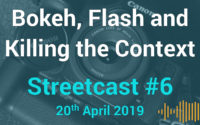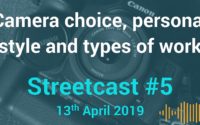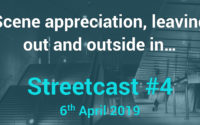Too frightened to do street photography? – Streetcast #3 – 30th March 2019
Showing people going about their private lives in public spaces is most of what street photography is about. How a public space is used; how people behave and how life exists on the street. While we are looking for aesthetic or interesting cameos, people with empathy tend to feel uncomfortable imposing on others.
I can understand this, as I hate the idea that someone may be left with a bad feeling, have a bad day or worse, simply because I want to pursue my art. I am pretty sure that I am not alone.
It appears to me that the most vocal street photographers seem not to care about the effect on, or don’t have compassion for, their subjects. But that was not the case with the more traditional and quiet street photographers of the past. And from their history and style we can learn a thing or two.
Henri Cartier-Bresson was a photojournalist. He earned his living through visual story telling for the news. He photographed the funeral of Gandhi, civil wars and was a photographer in world war II for the French army. Later, after a stint as a prisoner of war, he escaped and documented the occupation and eventual liberation of France.
These examples are horrific but also require an element of solemnness, respect and subtlety. Something that undoubtedly influences the value one would place on dignity, respect and compassion, not to mention life. His work was still hard hitting and candid, but I think in a respectful way.
The irony is that without empathy and compassion we can hardly understand another persons predicament. As a result without a sense of feeling we are not likely going to represent a “story” correctly.
Now I’m not suggesting we all go to war zones to witness atrocities to become better street photographers.
What I am saying, is that we need to decide if the current idea of in-your-face; and a no-holes-barred approach is actually what we personally want to strive for.
If the indifference to people is a disturbing concept to you, then you already find yourself leaning towards a more humanist approach.
Do we really want to loose our identity?
Do we really want to give up caring and loose our identity because someone else has, and then listen to them vehemently push that we should do the same?
I chose a long time ago that the HCB approach with empathy, compassion and respect was something I felt inherently. And I guess if you are listening to this, you do too.
Agreeing a moral framework & not compromise it
I concentrated my efforts on agreeing for myself a moral framework for my street photography and established a visual style that did not compromise it.
Perhaps you should look at the work from other people, reject the currently trending style that is probably not appropriate for you and like me, build your own. Even if you find yourself very similar in style to someone of the past, the moments you capture will still make your work unique.
After-all a table is still a table; whether it is a flat stone in the neolithic or a flat pack from Sweden with screws missing… The real value though is in how long it lasts, not how “exciting” it was to make…



